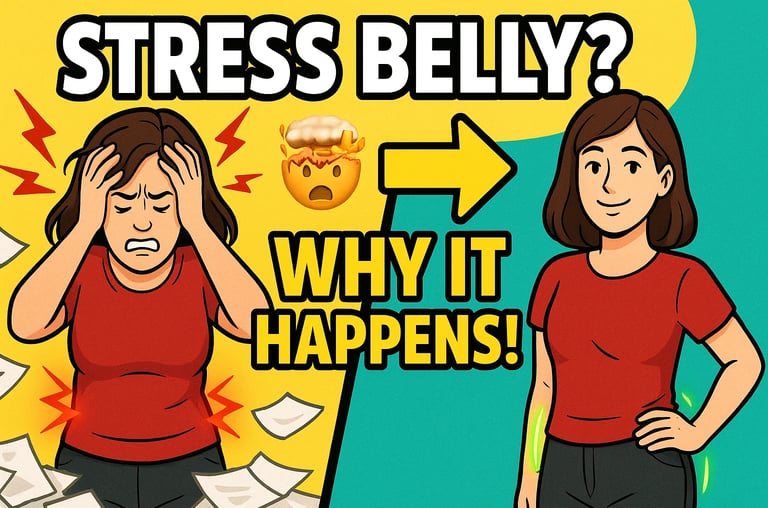✨ Kickstart Your Wellness Journey — Download the Free Detox Guide
The Science of Stress Belly: How Cortisol Causes Weight Gain & Stubborn Belly Fat
Discover why stress makes your belly fat stick around and how cortisol affects weight gain. Learn the science behind stress belly, how it triggers cravings, and practical strategies, including mindful eating, better sleep, and exercise, to finally shrink your waistline and regain control.
BLOG
thevibewell
9/1/20255 min read


The Science of Stress Belly: Why Stress Makes You Gain Weight
The Mystery of Belly Fat That Won’t Budge
If you’ve ever wondered why that stubborn belly fat just won’t shift, no matter how many crunches you do, or how clean your diet seems, you’re not alone. Countless women and men experience the same frustration: the midsection is the hardest place to lose weight, and sometimes, it feels like the harder you try, the worse it gets.
The truth is, this isn’t always about calories in versus calories out. It’s not simply about willpower, or whether you’re working out hard enough. A major culprit, often overlooked, is stress.
Yes, stress can physically change your body’s chemistry in ways that encourage weight gain, particularly around your middle. This phenomenon is sometimes called stress belly fat or a cortisol belly. And understanding why it happens is the first step towards overcoming it.
Let’s dig into the science of stress belly, why it develops, how hormones like cortisol and ghrelin play their part, and what you can do to finally get your waistline (and your stress levels) back under control.
The Role of Cortisol in Fat Storage
Why Stress Directs Fat to the Midsection
Cortisol is often referred to as the “stress hormone.” It’s produced by your adrenal glands whenever your body senses a threat, whether that’s a looming work deadline, financial pressure, or even a tough workout. In evolutionary terms, this was a survival mechanism, our ancestors needed cortisol to help them fight or flee in the face of danger.
But in today’s world, most of our stress isn’t life-or-death. Instead, it’s chronic. Think: traffic jams, endless emails, relationship struggles, money worries. When cortisol stays elevated over time, it wreaks havoc on your body.
One of its most noticeable effects? Fat storage, especially around your belly.
Here’s why:
Cortisol encourages fat storage in visceral tissue. This is the dangerous fat that wraps around your organs. It’s linked to higher risks of heart disease, diabetes, and inflammation.
Cortisol changes where your body stores fat. Under stress, your body preferentially directs fat storage to the midsection, even if you’re not overeating overall.
Cortisol increases insulin resistance. This makes it harder for your cells to use glucose effectively, meaning more of that energy gets stored as fat.
So when people talk about “cortisol belly,” they’re not exaggerating. It’s a very real physiological process—stress literally tells your body to hoard fat right around your waistline.
How Stress Affects Appetite & Cravings
Of course, it’s not just about fat storage. Stress also changes the way you eat.
Ghrelin, Leptin, and the Craving Cycle
Two major hormones regulate your appetite:
Ghrelin: known as the “hunger hormone.” It signals to your brain that it’s time to eat.
Leptin: known as the “satiety hormone.” It tells your brain you’ve had enough.
When you’re stressed, ghrelin levels tend to rise—making you hungrier than usual. At the same time, leptin signalling becomes weaker, meaning it takes longer for you to feel full.
Add cortisol to the mix, and the picture gets even worse:
Cortisol makes your body crave quick energy. That means sugar, refined carbs, and high-fat comfort foods.
These foods give you a temporary dopamine hit, which soothes your stressed brain, but only for a short while.
Soon after, your blood sugar crashes, leaving you more tired, more irritable, and hungrier than before.
It’s a vicious cycle: stress triggers cravings, you eat to soothe the stress, and then the aftermath of that food choice leaves you even more vulnerable to the next craving. Over time, this cycle adds up to weight gain, especially in the belly.
Practical Ways to Reduce Stress Belly
Here’s the good news: while you can’t eliminate stress entirely (no one can), you can control how your body responds to it. Small, sustainable lifestyle changes can help rebalance your hormones, lower cortisol, and gradually shift your body out of fat-storage mode.
Let’s look at the three most effective strategies.
1. Prioritise Better Sleep
Poor sleep and high stress are a deadly duo when it comes to belly fat. Research shows that people who consistently sleep fewer than 7 hours per night are far more likely to carry extra weight around the middle.
Why?
Sleep deprivation raises cortisol.
It also increases ghrelin and reduces leptin, so you feel hungrier, eat more, and crave sugar.
Your body becomes less insulin sensitive, encouraging fat storage.
Practical tips for better sleep:
Stick to a consistent sleep schedule, even on weekends.
Limit screens an hour before bed (blue light suppresses melatonin).
Try magnesium-rich foods like pumpkin seeds or a calming herbal tea before bed.
Keep your bedroom cool, dark, and free of clutter.
Improving sleep alone can drastically reduce stress belly over time.
2. Practise Mindful Eating
Stress often leads to mindless eating. How many times have you polished off a packet of biscuits or grabbed a takeaway without really tasting it, just because you were frazzled?
Mindful eating flips that pattern. It’s about slowing down, paying attention to your food, and re-engaging your body’s natural hunger and fullness signals.
How to eat mindfully:
Before eating, pause and take three deep breaths.
Eat without distractions, no phone, TV, or laptop.
Notice textures, flavours, and smells.
Chew slowly and put your fork down between bites.
Check in with your hunger, are you eating because you’re stressed, or because you’re actually hungry?
Over time, mindful eating reduces stress-driven cravings, helps you feel satisfied with less food, and gives your digestion a chance to function optimally.
3. Movement for Cortisol Control
Exercise is a powerful stress-buster, but it needs to be the right kind.
While high-intensity workouts burn calories, they can also spike cortisol if you’re already stressed. That’s why many people find themselves gaining belly fat despite hitting the gym daily.
The best exercise for reducing stress belly? Moderate, enjoyable movement that calms your nervous system while keeping your metabolism active.
Effective options include:
Walking: brisk daily walks lower cortisol and improve insulin sensitivity.
Yoga and Pilates: proven to reduce stress hormones and strengthen core muscles.
Strength training: builds lean muscle, which improves your metabolic rate without the cortisol spike of endless cardio.
Dancing, swimming, or cycling: fun, moderate activities that boost endorphins without overwhelming your system.
The key is balance: combine movement that strengthens and energises you with practices that calm and restore.
Conclusion: From Stress Belly to Stress-Free Living
If you’re struggling with belly fat that won’t budge, remember, it’s not a personal failure, and it’s not about lack of discipline. The science shows us that stress changes your hormones, your appetite, and your metabolism in ways that directly encourage belly fat storage.
But by addressing stress at the root, through better sleep, mindful eating, and cortisol-friendly movement, you can begin to reverse the process. Over time, your body will naturally shift out of survival mode and back into balance.
And if you’re ready to take the next step, I’ve got two powerful tools to help you:
👉 The Smoothie Diet: a simple, delicious way to reset your eating habits, reduce cravings, and support fat loss without calorie counting.
👉 Free Stress Relief Guide: packed with practical tips to lower cortisol, boost your mood, and reclaim your energy.
Your body doesn’t have to live in stress mode forever. With the right strategies, you can say goodbye to “cortisol belly” and hello to a healthier, calmer, more confident you.
The Vibe Well
The Vibe Well is your go-to space for natural wellness, faceless health courses, and everyday inspiration to feel your best.
© 2025. All rights reserved.


